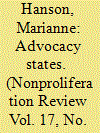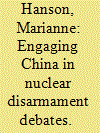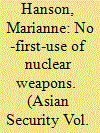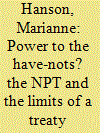|
|
|
Sort Order |
|
|
|
Items / Page
|
|
|
|
|
|
|
| Srl | Item |
| 1 |
ID:
093560


|
|
|
|
|
| Publication |
2010.
|
| Summary/Abstract |
While the current momentum for the elimination of nuclear weapons can be traced in part to the highly influential 2007 and 2008 Wall Street Journal opinion articles by George Shultz, William Perry, Henry Kissinger, and Sam Nunn, a more accurate picture of this momentum must take into account the role played by what are called here the "advocacy states." Motivated by a combination of humanitarian and strategic concerns, and mindful of the dangers of deterrence as well as proliferation, accidental use, and terrorist acquisition of nuclear material, these states have, for the past fifteen years, mounted a steady and repeated call for nuclear disarmament. Their activities have taken two main forms: the preparation of various state-sponsored reports investigating the utility and attendant dangers of nuclear weapons and making a strong case for nuclear disarmament; and the formation of like-minded groupings of states, namely in the New Agenda Coalition and the Seven-Nation Initiative, that are active in diplomatic forums and in practical projects. This article assesses the advocacy states' activities and shows that the states' reports and groupings increasingly focus on providing research, expertise, and technical assistance for the challenges facing disarmament. The article examines briefly the question of extended nuclear deterrence and disarmament (given that many of the advocacy states are Western allies) and considers the likely future role and activities for advocacy states. The author argues that these states have played a vital role in creating a climate in which the Obama administration can engage the movement toward disarmament.
|
|
|
|
|
|
|
|
|
|
|
|
|
|
|
|
| 2 |
ID:
105341


|
|
|
|
|
| Publication |
2011.
|
| Summary/Abstract |
China has demonstrated some interest in the resurgence of nuclear disarmament debates over the past few years, but because its own nuclear arsenal is relatively small, because this capability is predicated on a very specific Chinese posture and security concerns, and because it believes firmly that the responsibility for moving towards a world without nuclear weapons belongs in the first instance to the United States and Russia-who between them possess 95% of the world's existing nuclear weapons-it has displayed a somewhat limited contribution to this debate so far.
|
|
|
|
|
|
|
|
|
|
|
|
|
|
|
|
| 3 |
ID:
065107


|
|
|
| 4 |
ID:
187519


|
|
|
|
|
| Summary/Abstract |
Nuclear arms control and disarmament processes have stalled in recent years, and there is concern, especially among non-nuclear states, that the nuclear risk-reduction measures previously called for are not being met. One of the most important of these is the need for no first use (NFU) commitments to be given by all the nuclear weapon states (China and India have already done so.) The idea has been given recent impetus in the United States, especially as President Biden prepares the next US Nuclear Posture Review. Some states under the US nuclear umbrella, however, have expressed resistance to this idea, even as NFU would be highly-useful in reducing nuclear dangers. This paper argues that Australia, even though it is not formally under a US nuclear umbrella, has an important role to play in furthering prospects for NFU. The paper suggests ways in which this might be done.
|
|
|
|
|
|
|
|
|
|
|
|
|
|
|
|
| 5 |
ID:
158681


|
|
|
|
|
| Summary/Abstract |
The nuclear age has come to be seen as “normal,” marked by a process of “nuclearism” whereby nuclear weapons and deterrence are seen as inevitable and acceptable elements of international security. Factors which have allowed this to flourish include the relative absence of humanitarian considerations, nuclear decision-making by a select few, and the unequal nature of the Non-Proliferation Treaty (NPT), where the P5 states have shaped the nuclear order on their own terms. The “humanitarian initiative” and Treaty on the Prohibition of Nuclear Weapons challenge this “normal” nature of nuclear weapons, re-casting them as incompatible with humanitarian law, and delegitimizing them for all states. This shift away from the structural constraints of the NPT allows non-nuclear states a degree of agency they did not previously possess. Nonetheless, the Treaty faces difficulty in dislodging the practices of the nuclear-weapon states, suggesting that its value lies in its long-term normative influence.
|
|
|
|
|
|
|
|
|
|
|
|
|
|
|
|
| 6 |
ID:
185995


|
|
|
|
|
| Summary/Abstract |
The nuclear Non-Proliferation Treaty (NPT), its evolution over the past five decades, and the dissatisfaction of the non-nuclear states within it, can be analyzed by focusing on different understandings of power. Within the various concepts of power are claims which distinguish between what is known broadly as “power-over” and a more subtle form of influence, “power-to.” This article explores the history of the NPT, showing how the nuclear weapon states have shaped and limited this institution by practices which fall within the relational emphasis of “power-over.” Recently, however, non-nuclear states have adopted a “power-to” approach. Frustrated by their inability to bring about substantive change within the limits of the NPT, these states have realized and applied their agency and collective “power-to” in order to create an alternative approach to the problem of nuclear weapons in the context of the Treaty on the Prohibition of Nuclear Weapons (TPNW).
|
|
|
|
|
|
|
|
|
|
|
|
|
|
|
|
|
|
|
|
|